
9 of the World’s Deadliest Spiders
-
Brown Recluse Spider (Loxosceles reclusa)
John H. Gerard/Encyclopædia Britannica, Inc. The brown recluse spider is one of the most dangerous spiders in the United States. Its venom destroys the walls of blood vessels near the site of the bite, sometimes causing a large skin ulcer. Research in 2013 revealed that a protein in the spider’s venom targets phospholipid molecules, which make up a good portion of cell membranes, and transforms these molecules into simpler lipids. The wound that is produced may require several months to heal, or it may become infected, which could lead to the death of the victim. Deaths from brown recluse spider bites are rare. Most brown recluse spiders, which are also called violin spiders, live in the western and southern United States. Most are about 7 mm (0.25 inch) and have a leg span of about 2.5 cm (1 inch). On the front half of its body (the cephalothorax), it has a dark violin-shaped design, the “neck” of which is formed by a conspicuous furrow on the midline of its back. The brown recluse has extended its range into parts of the northern United States, making its home in caves, rodent burrows, and other protected environments. Brown recluse spiders also set up shop in the undisturbed spaces of buildings, such as attics, storage areas, and wall or ceiling voids.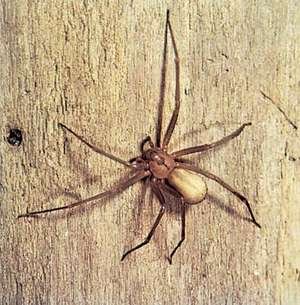
-
Brazilian Wandering Spiders (Phoneutria fera and P. nigriventer)
These species are sometimes also referred to as banana spiders because they are frequently found on banana leaves. They have an aggressive defense posture, in which they raise their front legs straight up into the air. Phoneutria are poisonous to humans, and they are considered to be the deadliest of all the world’s spiders. Their venom is toxic to the nervous system, causing symptoms such as salivation, irregular heartbeat, and prolonged, painful erections (priapism) in men. Scientists are investigating the venom of P. nigriventer as a possible treatment for erectile dysfunction.
In late 2013, a family in London, England, had to move out of their home so it could be fumigated, because it became infested with tiny Brazilian wandering spiders. An egg sac deposited in a banana bunch was shipped to the family’s local grocery store. (The egg sac went undetected by the supermarket chain and the importing company it works with.) After the bananas were purchased, the egg sac broke open, releasing its potentially deadly contents. -
Yellow sac spider (Cheiracanthium inclusum)
Yellow sac spiders are Clubionids, a family of spiders (order Araneida) that range in body length from 3 to 15 mm (about 0.12 to 0.6 inch) and build silken tubes under stones, in leaves, or in grass. Cheiracanthium inclusum, found throughout the United States, as well as in Mexico southward through South America, is venomous to humans and is often found indoors.
The spider’s venom is a cytotoxin (a substance that destroys a cell or impairs its function) that can produce necrotizing lesions, but such lesions occur rarely in bite victims. Still, redness and swelling at the site of the bite are common reactions. Yellow sac spiders are not docile creatures; a female yellow sac spider, for example may bite when defending her eggs. -
Wolf spider (family Lycosidae)
Wolf spiders belong to the family Lycosidae, a large and widespread group that is found throughout the world. They are named for their wolflike habit of chasing and pouncing upon prey. About 125 species occur in North America, whereas there are about 50 in Europe. Numerous species occur north of the Arctic Circle. Most are small to medium-sized. The largest has a body about 2.5 cm (1 inch) long and legs about the same length. Most wolf spiders are dark brown, and their hairy bodies are long and broad, with stout, long legs. They are noted for their running speed and commonly occur in grass or under stones, logs, or leaf litter, though they may invade human dwellings that harbor insects. Most species build silk-lined, tubular nests in the ground. Some conceal the entrance with rubbish, whereas others build a turretlike structure above it. A few species spin webs. Wolf spider eggs are contained in a gray silk sac attached to the female’s spinnerets, or silk-producing organs, so that she appears to be dragging a large ball. After hatching, the young spiders ride on the mother’s back for several days.
Although the spider is not considered to be aggressive, it will often bite people in self-defense. Wolf spiders are venomous, but their bites are not considered dangerous. (Some bite victims who are allergic to spider bites in general may become nauseous, dizzy, and develop an elevated heart rate, however.). The spider’s large fangs cause physical trauma at the site of the bite. The bite itself has been described as similar to that of a bee sting, and the venom the spider injects may cause itchiness at the site. This painful bite, coupled with their speed and startling appearance, can be unsettling, and some bite victims panic from the experience. -
Black Widow Spider (Latrodectus mactans)
Encyclopædia Britannica, Inc./Patrick O'Neill Riley The black widow is responsible for more than 2,500 visits to poison control centers every year in the U.S. It is one species that can be found from the United States and parts of Canada through Latin America and the West Indies. The most common member of Latrodectus in North America, it makes its home in a variety of settings, such as woodpiles, burrows, or among plants that serve as supports for its web. The female is shiny black and usually has a reddish to yellow hourglass design on the underside of the spherical abdomen. Sometimes two small triangles, instead of a complete hourglass, are present. The body is about 2.5 cm (1 inch) long. The male, seldom seen because it is often killed and eaten by the female after mating (hence the spider’s name), is about one-fourth the size of the female. In addition to the hourglass design, the male often has pairs of red and white stripes on the sides of the abdomen. Its bite, which may feel like a pinprick on the skin, often produces severe muscle pain and cramping, nausea, and mild paralysis of the diaphragm, which makes breathing difficult. Most victims recover without serious complications. Although the bite is thought to be fatal to very small children and the elderly, no deaths have been attributed to bites by widow spiders in the United States.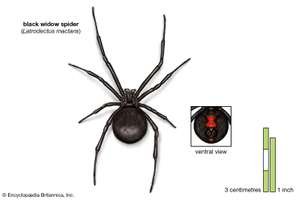
-
Brown Widow Spider (Latrodectus geometricus)
Encyclopædia Britannica, Inc. The brown widow is thought to have evolved in Africa, but the first specimen described came from South America. It is classified as an invasive species elsewhere around the world. Brown widow populations have appeared in southern California, the Caribbean, the U.S. states of the Gulf Coast, as well as in Japan, South Africa and Madagascar, Australia, and Cyprus. The species makes its home in buildings, inside old tires, and under automobiles, as well as among shrubs and other vegetation. The spider has a brownish appearance that ranges from tan to almost black. The abdomens of some specimens have ornate dark-brown, black, white, yellow, or orange markings. Unlike other members of the genus, the hourglass marking on the underside of the brown widow is orange. Brown widow venom is considered to be twice as powerful as that of the black widow; however, the species is not aggressive and only injects a tiny amount of venom when it bites. Still, brown widow bites were associated with the deaths of two people in Madagascar in the early 1990s. (These victims they were in poor health and they were not treated with antivenin.)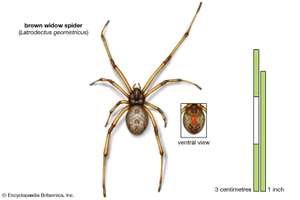
-
Red Widow Spider (Latrodectus bishopi)
Encyclopædia Britannica, Inc. The third widow spider on this list is the red widow, or red-legged widow. The spider’s appearance is distinguished from other widow spiders by its reddish cephalothorax and legs and its reddish-brown to black colored abdomen. Many red widows have a red mark on the underside of the abdomen, which may be either hourglass-shaped, triangle-shaped, or indistinct. The top of the abdomen is spotted red or orange, with each spot surrounded by a yellow or white outline. The legspan of an adult female is 1.5-2 inches, whereas the male is only about one-third of that size. Currently, red widow spiders inhabit palmetto-dominated scrublands in central and southern Florida; however, some experts believe that this range may be expanding. The spider feeds on insects, and it is not considered to be aggressive toward people. However, it has been known to bite when it is protecting its eggs or when it is trapped against a person’s skin by clothes or footwear. The bite of the red widow is similar to that of the black widow, and identical symptoms (pain, cramping, nausea, etc.) typically result. Likewise, death from a red widow bite is rare, since the spider injects such a small amount of venom. Very young children, the elderly, and people with health problems are most vulnerable to red widow spider bites.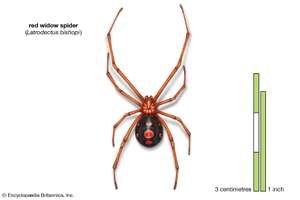
-
Redback Spider (Latrodectus hasselti)
Encyclopædia Britannica, Inc. The redback is another cousin of the black widow L. mactans; however, this species is not as widespread. It is native to Australia, but it has spread to New Zealand, Belgium, and Japan through grape exports. (The spider often builds nests and webs on grape leaves and inside bunches.) The species is widespread throughout Australia, living in all of the continent’s varied environments, except for its hottest deserts and frigid mountaintops. The species is also found in urban areas, frequently making nests in human dwellings. The redback is identified by its prominent red stripe or hourglass-shaped mark on its black-colored back. This mark is more noticeable on female redbacks than on males. Redback spiders are not aggressive and are more likely to play dead when disturbed, but a female spider defending her eggs is very likely to bite. Bites also occur when the spider climbs into shoes or clothing and becomes trapped against the victim’s skin when he or she is dressing. Both male and female redbacks are venomous, but most envenomations primarily result from female bites. Only 10-20% of all victims bitten are envenomed. The venom is a mix neurotoxins called alpha-latrotoxins, which produces pain, sweating, rapid heartbeats, and swollen lymph nodes. The spider can moderate the amount of venom it injects, and the severity of these symptoms often depend on how much venom is delivered. More than 250 redback bites are treated each year in Australia, many with antivenin. Researchers and physicians are split on the effectiveness of redback antivenin, with some studies indicating that it was not effective in treating symptoms or relieving pain. Nevertheless, the last human death attributed to redback envenomation occurred in 1956.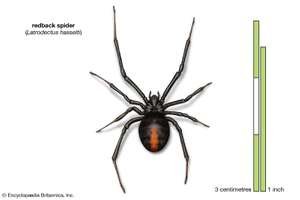
-
Funnel-web Spiders (family Dipluridae)
Encyclopædia Britannica, Inc. This family of spiders in the order Araneida are named for their funnel-shaped webs, which open wide at the mouth of the tube. The spider sits in the narrow funnel waiting for prey to contact the web. When this happens, the spider rushes out and captures the insect prey at the funnel’s mouth. The most important genera are Evagrus, Brachythele, and Microhexura in North America, Trechona in South America, and the poisonous members of the Atrax genus in Australia. The species Atrax robustus and A. formidabilis are large, brown bulky spiders that are much feared in southern and eastern Australia because of their venomous bites. Several human deaths from the bites of these aggressive spiders have been recorded in the Sydney area since the 1920s. An antidote to the main toxin in their venom has been developed which is effective if administered to victims soon after they have been bitten.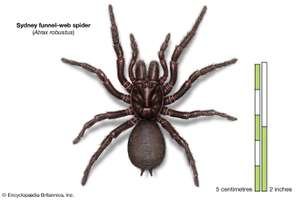
source
Posted from my blog with SteemPress : https://www.orak11.com/index.php/2018/07/31/9-of-the-worlds-deadliest-spiders/
Hi! I am a robot. I just upvoted you! I found similar content that readers might be interested in:
https://www.britannica.com/list/9-of-the-worlds-deadliest-spiders
Downvoting a post can decrease pending rewards and make it less visible. Common reasons:
Submit